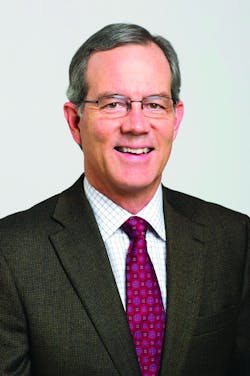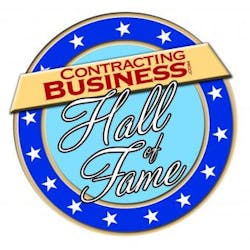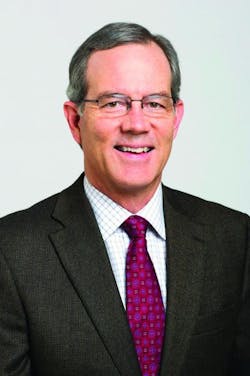Contracting Business 2015 Hall of Fame: Harold MacDowell — Coach. Mentor. Builder.
In 1988, MacDowell was named to lead TD’s special projects group, and one year later, was named vice president. It was a fast rise, but he was a worthy choice.
“At the time, construction at TD was all about the big jobs. I was coming off of managing a large project, and then, the savings and loan crisis hit in 1989, and all the big jobs disappeared.” The solution? Existing buildings.
“We dubbed existing buildings ‘special projects,’ and turned them into a great profit center and niche for TD, which still survives to this day,” he shares. “New construction and existing buildings are important elements in our diversification strategy.”
MacDowell had been preparing for the role of CEO, and when he got the call, he felt he was indeed ready. It was the natural next step in his TD career.
“I had fallen in love with building buildings, and then, was excited about building teams; and then I had the opportunity to keep this great company growing. Now, my role is coaching men and women that are running their own $20 million to $50 million businesses within TD.”
Harold MacDowell believes TDIndustries’ greatest achievement over the last 10 years has been to create more than 700 full time jobs, and increase the value of the company by more than 230%.
One of MacDowell’s constant watchwords has been “improvement.”
“We’ve always been committed to continuously improving how we do things,” he says.
“It started in the late 1980s, when we embraced Total Quality Management, which today has morphed into Lean Construction and Lean Principles. We’ve added those tools to our TQM toolbox. We continue to find ways to become better. We elevated the bar as far as personal accountability goes, and we began to do a better job of looking at data and metrics related to business performance. That can lead to some hard people decisions that we’ve tried to work through with dignity and respect.”
As CEO, MacDowell continues his efforts to deepen TD’s commitment to servant leadership, and to the “Great Place to Work” environment that plays such an important role in workforce development and retention.
“We’re committed to staying on Fortune’s list of “Great Places to Work” — they’ve made it for 17 straight years — as a way to benchmark our culture against the great business cultures across the entire United States, not just in our industry,” he says.
TDIndustries under Harold MacDowell is also elevating its commitment to safety, and it hopes to bring its safety practices to what MacDowell describes as a “world-class level.”
MacDowell wants to expand TDIndustries’ into heavier industrial work, and oil and gas piping and delivery systems on the Texas coast. We’re very interested in the long-term market for compressed natural gas as a transportation fuel. To do that, we have to have a much better safety record than what the general building industry thinks is great.
“We’re trying to go deeper, not wider. We want to increase our revenue in the geographies we work in, to provide stable jobs. In the event one of our sectors goes down, we don’t want to have to lay anybody off.”
We've learned through every down cycle in the economy of the need to react quickly, and look far enough ahead to be sure we have the revenue we need to keep people employed.— Harold MacDowell
MacDowell says TDI will continue to hit home runs in health care, education, data centers and commercial office spaces, but expansion into more industrial work will widen its job base.
“As we add oil and gas projects, we will have much more diversity, to keep our 2,000+ workforce employed. The worst part of the job is a workforce cutback,” he says.
Fast on Their Feet
Harold MacDowell has never lost sight of the need to react quickly to tough times. He was with the firm during the savings and loan crisis, and says he admires the way Jack Lowe, Sr. and Jack Lowe, Jr. worked through the challenge, and convinced so many of the younger employees to reinvest, to give them the capital they needed to survive. With TDI, it’s always been about keeping people employed.
“We’ve learned through every down cycle in the economy of the need to react quickly, and look far enough ahead to be sure we have the revenue we need to keep people employed.
“We moved faster, embraced very large projects, and moved to stay close to our long-term customers. We gave our long-term customers a lot more attention. Then we targeted what key jobs were out there to be sure we got more than our share.”
Harold MacDowell believes TDIndustries’ greatest achievement over the last 10 years has been to create more than 700 full time jobs, and increase the value of the company by more than 230%.
“In an ESOP, you share the wealth of the company, and that’s important. People are putting their money in every week, and they want to be able to sell it some day for a lot more than they paid for it. Even with the down cycle at the beginning of that 10 years, we’ve had a nice run and that’s going to continue,” he predicts.
This servant leader says his greatest struggle has been in letting go of the things that were always important parts of his daily routine, prior to his assuming the role of CEO. But today, to stay in touch as much as he can, he tries to divide his weeks into five appointment “buckets” —
• 1 day a week with customers
• 2 days a week managing the business
• 1 day a week with future leaders: succession planning and finding leaders to take the business forward for the next 20 years.
• 1 day a week “working the plan,” looking five to 10 years down the road. This includes quiet time, reflection time, peer group meetings, industry meetings and board meetings.
“Every week, I take note of how close I am to that time allotment,” he says. “If I’m not close, I try to see what adjustments I can make.”
You have to take a long view of where you want your organization to grow: look beyond the financial metrics. — Harold MacDowell
Whenever TDIndustries names its next CEO, MacDowell says it will be someone who is consistent with its core values: Concern for and belief in individual human beings / High Standards of Business Ethics / Building Trusting Relationships / Valuing individual differences / Responsible Behavior / Fairness / Honesty / Safety.
“More than anything else, we want our next CEO to be a great culture fit. Then, having the ability to live out the core values is most important. I’m looking for someone who’s better and smarter than I am. The business keeps growing, and it’s going to need one heck of a leader as it heads for $1 billion,” MacDowell declares.
Independence & Culture
MacDowell echoes Jack Lowe, Jr. when asked why TD resisted the consolidation movement: with every attempt, the culture mattered more.
“We’ve had so many potential buyers through the years — Blue Dot, Enron, and many others — and our conclusion each time was that selling out would kill the culture. If we sold out to somebody else, they’d want to run the number up, flip it, and take it public. And I haven’t seen many of those operations preserve the cultures of the great companies that were bought out. We’re focused on generating the wealth through the ESOP, without killing the culture.”
And yet, TD’s phone keeps on ringing, as prospective buyers keep on calling.
“We probably get one call a month from a private equity firm,” MacDowell shares. “Many are just fishing, and not always serious. There’s so much money out there looking for places to invest, and they want to buy great companies.”
To young people interested in emulating Harold MacDowell’s success, he says: seek out great mentors and coaches.
“Find somebody who will help you grow, somebody who will give you real feedback. Then, the sky’s the limit.”
And to those company owners who want to emulate the success TD has enjoyed, he offers this advice:
“You have to take a long view of where you want your organization to grow: look beyond the financial metrics. If you can figure out your core values, what you want to be when you grow up, then you can attract the right people and you’ll make money.
“Don’t start with the bottom line. Start with a longer view of where you want the business to go or be someday. Jack, Sr. had that, and Jack, Jr. took it to a whole new place, and now we’re just building on it.”
About the Author
Terry McIver
Content Director - CB
As director of content for Contracting Business, he produces daily content and feature articles for CB's 38,000 print subscribers and many more Internet visitors. He has written hundreds, if not two or three, pieces of news, features and contractor profile articles for CB's audience of quality HVACR contractors. He can also be found covering HVACR industry events or visiting with manufacturers and contractors. He also has significant experience in trade show planning.


